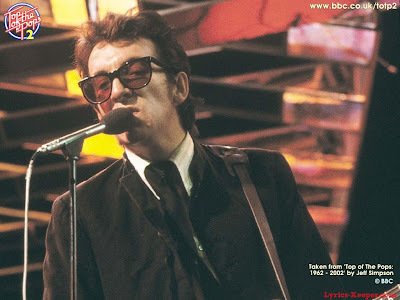
Elvis Costello exploded on the late-1970s music scene as part of a new wave of brash singer/songwriters who reinvigorated the literate, lyrical traditions of Bob Dylan and Van Morrison with the raw energy and sass that were principal ethics of punk. Early in his career, Costello listed "revenge and guilt" as his primary motivations, but what really counted was the construction of his songs, which set densely layered wordplays in an ever-expanding repertoire of styles. Since Costello's melodic instincts were as sure as his gifts as a lyricist, his musical experiments generally drew kudos, enhancing his reputation as a quintessential critics' favorite. (Rock singer David Lee Roth once remarked that critics liked the bespectacled, nerdy Costello because they all looked liked him.) Granted, some members of the pop intelligentsia never forgave Costello for moving beyond the brazen minimalist urgency of his early seminal albums; but it's just this progress that has allowed the singer to remain a relevant, respected artist.
Elvis Costello's (b. Declan Patrick MacManus, August 25th, 1954, Paddington, London) father was a successful big-band singer and trumpet player. While attending Catholic school in working-class London, Costello tried playing violin and several other instruments before discovering the guitar at 15, at which point he was already interested in songwriting. Soon after, he moved to Liverpool to live with his mother, who had divorced his father. In the early 1970s, he and his high school sweetheart married and had a son, settling in London. There, Costello continued to write, record demos, and perform (sometimes under the name D.C. Costello, his mother's maiden name), while supporting his family as a computer operator. In 1975 he quit his job, became a roadie for Brinsley Schwarz, and became friendly with their bass player, Nick Lowe. Stiff Records signed Costello in 1976 on the advice of staff producer Lowe; one of the label's owners, Jake Riviera, became his manager and rechristened him Elvis Costello.
Costello's first single, "Less Than Zero," was released in April 1977 and later included on his phenomenal Lowe-produced debut My Aim Is True. Soon Top 20 in England, Aim (Number 32 U.S.) made Costello a major British cult star and attracted critical kudos in the U.S. The now-classic album, which included one of popular music's best-ever heartbreak songs in "Alison," as well as the haunting "Watching the Detectives, and the melodically-addictive "(The Angels Wanna Wear My) Red Shoes" was recorded with the Northern California band Clover — a group that would form the basis of Huey Lewis and the News — and made in six sessions for under $2,000.
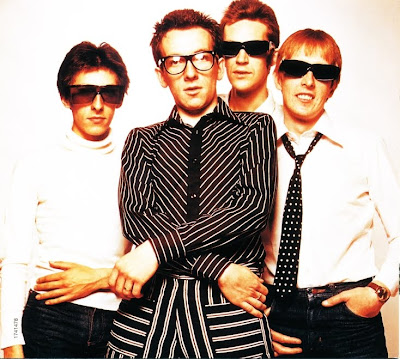
Costello then assembled the Attractions: keyboardist Steve "Nieve" Nason, drummer Pete Thomas, and bassist Bruce Thomas. Bolstered by his new cohorts on This Year's Model (Number 30, 1978), he rocked harder, while maintaining his distinctively wounded, clipped vocal delivery. Meanwhile, his "angry young man" image was amplified by punk-friendly habits like onstage rudeness, brief sets, and an aversion to the press. His next release, the Top 10 Armed Forces (originally titled Emotional Facism), repeatedly equated love affairs with military maneuvers ("Oliver's Army"). By then Costello's style encompassed lush, Beatlesque arrangements and more diverse influences.
While he toured the U.S. to promote Armed Forces in 1979, Costello's onstage contrariness and dark moods — sometimes induced by drinking — reached alarming proportions. In Columbus, Ohio, that March, a minor but much-publicized conflict with American singers Bonnie Bramlett and Stephen Stills occurred in a hotel bar after an inebriated Costello reportedly disparaged Ray Charles with a racial epithet. Besides tainting his work with the Rock Against Racism organization, this outburst brought the wrath of the previously supportive press — though he subsequently issued a formal apology. Costello lay low for a while, producing the Specials' 1979 debut and appearing at the Concert for Kampuchea.
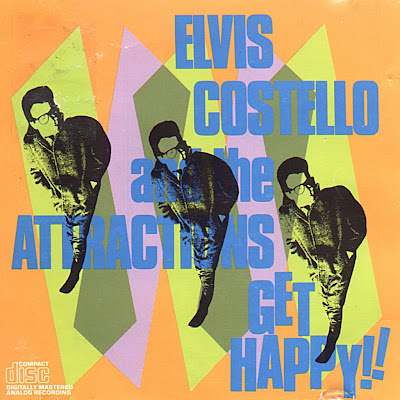
Trust (Number 28, 1981) brought Costello back to frontline duty with a more piano-based songs and an accompanying American tour that revealed an uncharacteristically polite and reserved stage manner, as if experience had mellowed the performer, who was still in his mid-20s. His touring partners were Squeeze, a critically acclaimed pop band whose 1981 LP East Side Story Costello co-produced. Later that same year Costello released Almost Blue (Number 50), an album of country & western covers recorded in Nashville that got mixed reviews. (A C&W aficionado, Costello later re-covered a version of his "Stranger in the House" with George Jones, while Costello's songs have been covered by Dave Edmunds and Linda Ronstadt.)
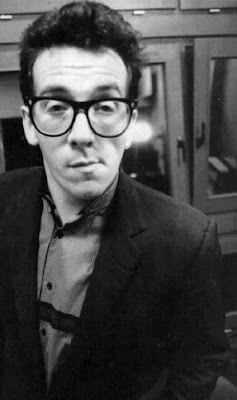
Imperial Bedroom (Number 30, 1982), in contrast, earned raves. Full of wry, elegant, haunted ballads, the extraordinary album marked Costello's most sophisticated pop craftsmanship yet, garnering comparisons to such pre-rock bards as Cole Porter and Rodgers and Hart. With 1983's Punch the Clock (Number 24), Costello continued to move beyond the punk minimalism of his early work, serving up soulful, accessible pop ("Everyday I Write the Book," a Top 40 U.S hit and "Everyday I Write the Book with Daryl Hall.) and serious balladry (the politically astute "Shipbuilding"). While less consistent, 1984's Goodbye Cruel World (Number 35) also found him diversifying in this vein.
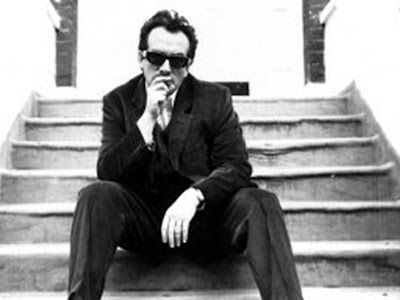
Costello's personal life was also undergoing changes. Estranged from his wife, he struck up a relationship with the Pogues' bassist Caitlin O'Riordan while the Irish band toured with him in the fall of 1984. (Costello also produced the Pogues' 1985 album, Rum, Sodomy & the Lash.) Costello divorced his wife in 1985 and married O'Riordan in 1986. Also in 1986, Costello temporarily traded in the Attractions for a pickup band he called the Confederates — former Elvis Presley musicians guitarist James Burton, drummer Ronnie Tutt, and bassist Jerry Scheff — who appeared with him on all but one cut (on which the Attractions appeared) on the lushly melodic King of America (Number 39). Later that same year, Costello reenlisted the Attractions for the more raucous Blood and Chocolate (Number 84). The tour to promote both these albums alternated between sets featuring the Attractions, the Confederates, and Costello performing solo, acoustically. In addition, Costello designed the Spinning Songbook, a device through which audience members could "choose," by luck of the draw, songs from his vast repertoire.
In 1987 Costello co-wrote a bunch of songs with Paul McCartney, several of which materialized two years later on Spike (Number 32). Costello's 1989 album — which also included support from Roger McGuinn, Chrissie Hynde, and the Dirty Dozen Brass Band — produced a Top 20 hit in the McCartney-Costello collaboration "Veronica" (Number 19, 1989) and went gold. Some critics found Spike inconsistent, though, preferring the subsequent collection Girls Girls Girls, on which Costello chronicled his career thus far with his own favorite material.
Much like Spike, 1991's Mighty Like a Rose (Number 55) was made without the Attractions, and was perceived as lacking focus. In 1993, though, Costello found a new sense of direction in perhaps his most ambitious project yet: The Juliet Letters (Number 125), a song cycle he wrote and performed with the string players in England's Brodsky Quartet, inspired by an article about letters sent to Shakespeare's character Juliet Capulet, received by a Veronese academic. The album and subsequent tour drew wild praise from some, while baffling or putting off others. Meanwhile, in the 1990s, Rykodisc began releasing the early Costello albums on compact disc, with extra tracks consisting of live and previously unreleased recordings.
In 1994 Costello reunited with the Attractions for Brutal Youth (which also featured Nick Lowe); the maturely rocking results garnered almost unanimous acclaim, and the album climbed to Number 34. That summer, Costello began touring with the Attractions, marking a reconciliation between Costello and bassist Bruce Thomas, whose published memoirs had enraged the singer. In 1995 Costello was back on his own (with some help from Attractions drummer Pete Thomas and a handful of studio musicians) with Kojak Variety (Number 102), a cover album featuring songs by Screamin' Jay Hawkins and Bob Dylan, among others.
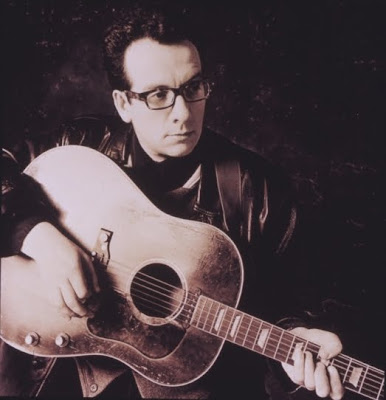
The following year Costello covered himself on All This Useless Beauty (Number 53), which highlighted several original Costello songs that had been recorded by other artists. Also in 1996 the cynical Costello surprised critics and fans by collaborating with '60s love-song composer Burt Bacharach for the soundtrack to the film Grace of My Heart. Their co-written effort, "God Give Me Strength," was featured in the movie, nominated for a Grammy, and paved the way for the duo to write enough songs to record their own album, Painted From Memory (1998). A track from that album, "I Still Have That Other Girl," won the pair a Grammy for Best Pop Collaboration With Vocals. Costello and Bacharach became so well known as artistic partners that they appeared together in a cameo as themselves in the comedy Austin Powers: The Spy Who Shagged Me in 1999. Costello lightened up enough to appear as himself in the Spice Girls movie Spice World (1997) and the 1980s nostalgia flick 200 Cigarettes (1999).
Costello continues to tour, sometimes as a duo with Attractions keyboardist Nieve. He has recorded with his son Matthew and Supergrass drummer Danny Goffrey. In the late 1990s and 2000, he contributed original songs to movie soundtracks and returned to dabbling in classical music: He played on classical saxophonist John Harle's 1997 album Terror & Magnificence and in 2000 produced songs for Swedish mezzo-soprano Anne Sofie von Otter.
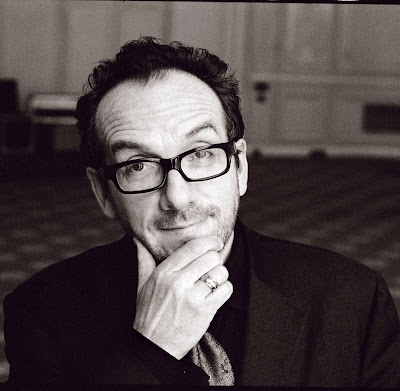
In 2001, Rhino Records began an ambitious overhaul of the singer's catalog up to 1996, reissuing all of his albums with each set containing extensive liner notes written by Costello and an extra disc of rare tracks. That same year, he got a residency to teach music at the University of California in Los Angeles. He also teamed up with old pals Thomas and Nieve on a new album, When I Was Cruel, released in 2002 on Island Records. The following year, Costello released an album of pop ballads, North. In 2004, he was extremely prolific, collaborating with his new wife, jazz singer Diana Krall, on her album The Girl in the Other Room, and releasing two discs of his own: Il Sogno, an orchestral work based on Shakespeare's A Midsummer Night's Dream, and a more straight-ahead roots-rock album, The Delivery Man. The latter featured his new group the Imposters – the Attractions with a different bass player, Davey Faragher, formerly of Cracker.
In 2005, Costello was commissioned to write a chamber opera for the Danish Royal Opera. In 2006, Costello released a live album with a jazz orchestra and collaborated with New Orleans music legend Allen Toussaint on an R&B album inspired by the devastation of Hurricane Katrina. In late 2007, Costello reunited with Clover, the backing band on his debut album My Aim is True, for a benefit show at San Francisco's Great American Music Hall. It was their first live performance.
In 2008 Costello began taping episodes for a forthcoming talk and music show entitled Spectacle: Elvis Costello with...! for the Sundance Channel featuring diverse music guests such as Smokey Robinson, Rufus Wainwright, Kristofferson, Herbie Hancock, and Jenny Lewis.
Various Videos Of Elvis Costello
Elvis Costello - Alison 1st TV Appearance
Elvis Costello - Pump it up (Music Video)
Elvis Costello - Watching The Detectives - 1977
ELVIS COSTELLO - Oliver's Army (Music Video)
Wiki info can be found here http://en.wikipedia.org/wiki/Elvis_Costello
Rock On Music Lovers!!
-Stereo
If you liked this article then make sure you subscribe to the feed via RSS
It's Free. You can also follow me on Twitter too!
Check out the Retro Rebirth Design Catalog


No comments:
Post a Comment